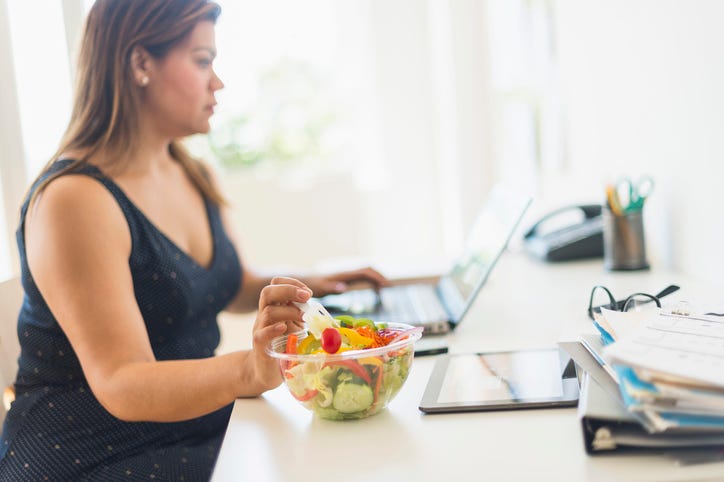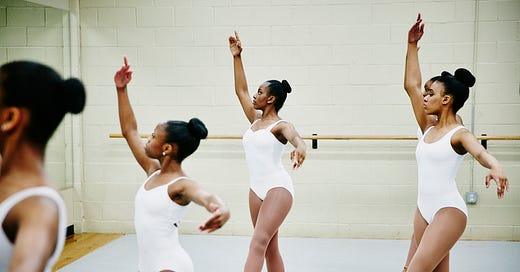CW: This essay contains discussion of eating disorders, intentional weight loss and a few very explicit examples of anti-fat bias. Take care of yourselves.

I apologize that the start of this essay is going to disrupt your illusion of the Burnt Toast timeline, but: Last week, when Corinne and I recorded the February Ask Us Anything episode that you’ll hear a couple of weeks from now, she told me to listen to Glennon Doyle’s recent interview with the brilliant Sonya Renee Taylor. So in two weeks you’ll hear what Corinne thought of that episode and me politely agreeing that both Glennon1 and Sonya are brave, incredible humans, because I knew that, but hadn’t listened to the conversation yet.
But then we finished recording, and I listened to the conversation. And it is as important as Corinne says for so many reasons and also for one particular line, which I cannot stop thinking about, and now need to write my way through.
It’s a fairly small moment in the conversation, when Glennon says: “Control is the opposite of love. We only control what we don’t trust.”
And I thought, oh fuck.
I am someone who has often mixed up love and control. Dismantling perfectionism has become an unexpected recurring theme of this newsletter because perfectionism is baked into diet culture, both of which are baked into white supremacy. It’s also because, in order to write this newsletter, I’ve spent the past two years moving away from my previous life as a freelance journalist who thought I worked for myself and controlled my own time but actually lived and died by the demands of a dozen different editors. That transition has freed me up to realize just how much of my work life has been bound up in perfectionism and control and mistaking dedication to the grind for achieving excellence. My need for control also shows up, in a big way, in my relationships and my parenting. I’m not going to write about those much here today, but I will say: If you are someone who likes fixing things, it is very, very hard to start learning how to stop fixing everything because what is the fix for that.
It’s interesting that I’m just now getting to this layer of work; I’ll be 42 in three months, and I thought I opted out of diet culture a decade ago. I stopped pursuing intentional weight loss eight years ago. And yet I’ve continued to be driven by a need for perfectionism and control in terms of my work, my house, my parenting, my relationships, and even my appearance, in ways that are absolutely vestiges of diet culture (and so much other/related learning), which I am only now beginning to unpack.
And as I’ve been turning that line —control is not love—over and over in my mind, I’ve been seeing how much I am not alone in confusing love and control. The new AAP guidelines are a set of instructions for doctors trying to control children’s bodies. The children who will be harmed most by that guidance are kids who are loved or cared for by adults who also want or need to control bodies. Because that’s an awful lot of us, right? We’ve all been taught to control our own bodies in order to feel loved, to have a space in the world. As I’ve been wading through some of the backlash to my critique of that, I’ve been hearing from so many people who are mad at and disgusted by me. And I suspect that anger and disgust are layered on top of fear. They are sure they need weight loss (and that fat kids need weight loss), because getting smaller makes them feel in control.
“I wish I would have lost weight at 7, it would have made my whole life easier,” one person tweeted.2 “I’ve never had any health problems but I do not believe that you can be ob*se and healthy your whole life.” This person is not talking about diabetes or heart disease risk; they’re talking about making their life easier, because it feels so hard, and so dangerous, to exist in a fat body. It makes sense to reach for weight loss to protect yourself from this harm. It won’t work, for all the reasons we always discuss here. But it’s a logical coping strategy to try to control your body because you can’t control the world. “I would be dead by now if I hadn’t been ashamed of being fat,” another person tweeted. “It gave me a reason to try to correct the situation.”
We’re also seeing these themes emerge on TikTok and Instagram right now, as several popular fat content creators have recently publicly pursued intentional weight loss and begun to divorce themselves from the fat activism movement. There is a longer conversation to be had about the significant harm this is causing (Catherine of @fatangryblackgirl covers it all so well), but when I watch the videos of fat creators now rejecting fatness, I am also uncomfortably recognizing: These are my fellow seekers of control. They have been public fat people on the Internet for years, which probably never felt safe, and they are now fleeing to what they hope will be higher ground.
Seemingly on the the flip side (but it’s all the same side), a reader just messaged to let me know that she tried talking about how focusing on BMI and body size harms thin kids too, which it absolutely does. And a parent of elementary school-aged kids who follows her responded, “I completely disagree. My kids work hard for their bodies and should feel proud.”
Control is not love. I don’t believe that intentional weight loss—under our current conditions, where we’re abused and coerced to believe shrinking ourselves is necessary— can ever be an act of self love, period, let alone a form of the “radical self love” that Sonya Renee Taylor talks about. But control is such a common stand-in for love because we control in order to feel safe. We pursue our own weight loss because it makes our bodies more acceptable and that feels safer. That mother wants her kids to “work hard” on their bodies, because she knows the currency and the power held by an idealized body. And those kids are working hard, at least in part, because hard work is helping them access love. Lots of childhood dieting and exercise abuse begins as a quest for love and safety. And then we grow up and try to control what and how much our kids eat because we want them too to be “healthy,” or “good eaters,” or “less picky,” or “not a sugar addict.” We want to feed them perfectly. And all of those are different ways of saying what we’re really doing, which is using our child’s body, or our child’s relationship with food to feel safe and good—about their bodies, our parenting, ourselves.

But we can’t separate our need for control, for self-preservation, from the potential to do harm. As Sonya Renee Taylor said, in response to Glennon:
“What does it mean to decide that my body and I are on the same team? It’s not a thing I control, it’s not a thing that has to do my bidding. And anytime we find ourselves in a way of thinking relationally about our bodies that gets reflected in the ways in which marginalization and inequity are set up in the external world is a great clue that we’re outside of radical self love. When I treat my body as a thing that has to do my bidding, where else do we see that? Where else does that dynamic play out? Oh okay, in all manner of inequity and injustice.
“And so the question is, am I in a just relationship with my body? If I’m saying I want to practice justice, am I in a just relationship with my being right now today? Are the dynamics of dominance, control, coercion, force, are all of those the way in which I’m in relationship with my body?”
The stakes of letting go feel so high: The risk for malnutrition. The risk for eating disorders. The risk for fatness (which shouldn’t be equated with those first two, but very much is by our culture). The risk for judgment and shame if one of those worst case scenario outcomes happens. And the risk, to quote Sonya talking to Glennon once again, that “we’ll lose the perks” that striving for control provides:
“Because here’s what’s happening is we’re holding two things at the same time. Like you said, Glennon, we’re holding both a victimization by this system and we’re also holding a complicity and a proselytizing of the system at the exact same time. And so what that means, when I talk about it in terms of a ladder of bodily hierarchy is, we are neither at the top of the ladder nor are we at the bottom. And the entire goal of the system is to figure out how to ascend as high as possible while recognizing that most of us live in bodies that will never exist at the top. But as long as there are people below us, then we know we’re better than something, even if that’s not conscious. [...] And so the fear is whatever I got at rung eight, I’m going to drop to rung three if I denounce the ways in which white supremacist delusion has indoctrinated me, then I’m going to lose the perks that whiteness gives me. And I don’t want to acknowledge all the perks that whiteness gives me because then that makes me a bad person.”
Motherhood, especially the kind of white motherhood currently idealized in our culture, is absolutely another one of these ladders. I learned this when our older daughter didn’t learn to eat by mouth until I began to let go of control and let go of my rung on that ladder of good mothers. I had to acknowledge and then step back from how much I needed her to get off her feeding tube; I had to challenge the inherent ableism of my wanting not only a kid who ate by mouth, but a kid who ate the way mothers like me are supposed to be able to get our kids to eat. And I managed to stop controlling her by embracing the Division of Responsibility, which is rooted in helping parents understand which parts of the feeding process we should stop trying to control.

But it also says something that I needed a model, a method, a protocol, to help me do that. That I needed to follow that program perfectly, to feel okay about all the things I wasn’t trying to control anymore. To feel safe in my new identity, as a mother who failed at breastfeeding, as a mother who buys processed food, as a mother who doesn’t force her kids to eat.
Almost a decade later, those no-longer-new identities do feel secure; I rely on DOR far less now, and accept so much more imperfection from my kids and myself in terms of food. I value how our imperfection makes space for other ways of eating and being in the world. But I put Rule Number 2 on our family dinner list because I know I’m not done trying to control this (hello we made a list of family dinner rules!) and I need the continual reminder to recognize and step back. (Related, I so appreciate Laura Thomas’s recent breakdown of what does and doesn’t serve us in DOR.)
Look, even writing this essay is an act of control. I just spent two weeks being inundated with reply guys and angry messages every time I log onto a social media app, something I’m expected to shrug off as part of the job and so I do (especially because I know I get so much less of this than I used to, and than activists and writers more marginalized than me receive). And that works until I wake up with a migraine and realize that actually, I can’t control how my nervous system responds to that onslaught. That level of dedication to the grind isn’t for me not because I’m not great at it, but because it costs me even while I excel at it. So now I’m looking for some common experience of being human to help me understand why people yell at people on the internet, why parents tell their kids how to eat, why nobody feels safe in the bodies and lives that we have and how that makes us all lash out at each other.
So maybe “I wish I would have lost weight at age 7” isn’t about control at all for that person. Maybe that’s just their truth. And maybe I have to just let that stand and not try to control it by investigating it and explaining it. Because control is not love. And I sure don’t have to love every stranger who gets mad at me on the Internet. But I am interested in controlling less. And trusting people more. And admitting when I don’t know what that should look like.
Also Abby! And Amanda, but Abby is probably my favorite? Is it weird to have a favorite? Anyway.
I am not going to link to these tweets because I do not want any of us engaging with these individuals both for their safety and mine.




Loving all these thoughts, especially back to back with Anne Helen Peterson’s write up on the “anxious style” in American parenting from a couple of days ago. I have been up close and personal with that, having an almost 3yo but also being the product of avant-garde philosopher artist types (if IRL people had catchphrases my stepmom’s would be “everything is a construct”.) Not to say I’m specially above it all, just been off to one side long enough to have a different angle.
I would love to know whether/how this kind of quest for control manifests in societies with a robust communal support system (welfare state or otherwise). I know I feel the strongest urge to control things when I’m brought face to face with just how utterly alone many (middle/upper class) Americans are in the face of basically any difficulty. For us Millenials, even the bog-standard etiquette seems to emphasize monetary and logistical support that can be done at a distance, emailing a delivery gift card or dropping off a frozen meal on someone’s porch so as to not intrude. When I was freshly post-partum and struggling to breastfeed (ultimately unsuccessful, hello fellow BF dropout), what I really wanted was people I felt comfortable being undressed with - literally and figuratively - who would sit with me - again, literally and figuratively - while I was frustrated but still trying. A casserole is nice but I can order all sorts of meals to my house, there’s no gig economy app for real social support. (Yet… j/k)
On that note, please enjoy one of my dad’s catchphrases, on being self employed (which he has done for 4 decades and counting) “you trade the illusion of security for the illusion of control.”
Progress is not linear. It’s not orderly. But it is cumulative. It’s how we learn.
Thank you forever for this essay, Virginia. It touches on things I’m still unpacking in my own life.
We must stop apologizing for our messy imperfect selves.